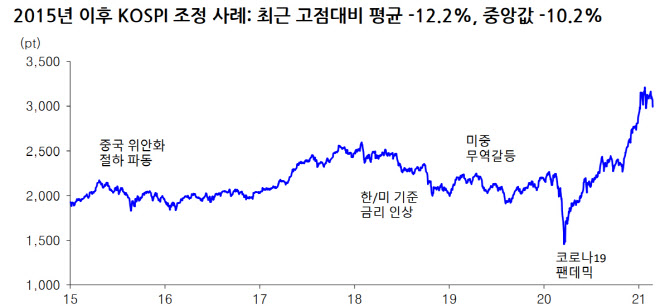|
In a report on the 25th, Dae-Seok Kang, a researcher at Eugene Investment & Securities, said, “The fact that interest rates do not fall significantly despite the reconfirmation of the dove-like stance of the US Fed Chairman Powell disproves market concerns.” In the case of an additional 2~3% adjustment, primary support is possible.”
On the 24th, the KOSPI index fell 2.45% from the previous day, closing at 2994.98. It was below the 3000 line for the first time since the end of January, down 8.3% from the peak. On that day, Jerome Powell, chairman of the Federal Reserve System (Fed), reaffirmed its easing monetary policy stance, but the news that the Hong Kong government is raising the stamp duty (transaction tax) rate on stock transactions in Hong Kong from 0.10% to 0.13% was reported. The sense of crisis about shrinking increased. As a result, the Chinese stock market and the Korean stock market were affected and fell sharply.
Researcher Kang believes that the adjustment width will no longer be large. Researcher Kang said, “Since 2015, the adjustment range of the KOSPI index was -12% on average and -10% based on the median value.” “Even in the tapered tentrum period in May 2013, the KOSPI index was -12 compared to the peak for about a month. It has rebounded after falling %.”
However, it is explained that it is necessary to prepare for the continuation of the adjustment market. Researcher Kang pointed out that “the recent concerns about inflation and rising or tightening interest rates are not issues that can be resolved in the short term. We need to be prepared for the possibility of a continuing correction market.”
The weakening of the buying trend of individual investors is also an obstacle. Since customer deposits reached 74.5 trillion won on January 12, it has declined close to 10 trillion won in about six weeks, and individual investors’ purchasing power is decreasing.
Researcher Kang said, “It can be interpreted as meaning that the current valuation is not cheap for individual investors who have contributed to the defense of the stock market decline in the Corona 19 crisis. It is highly likely that it will act as a negative factor.”

